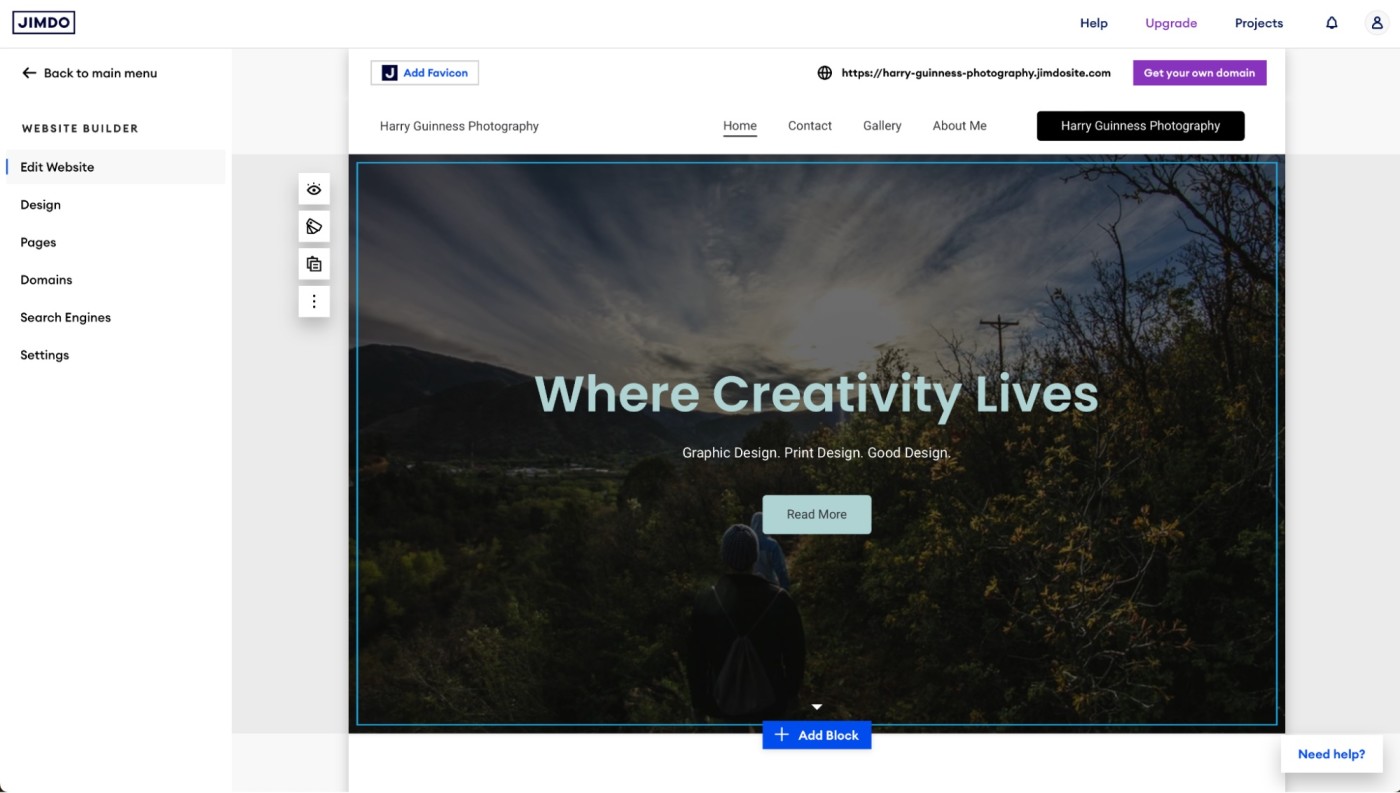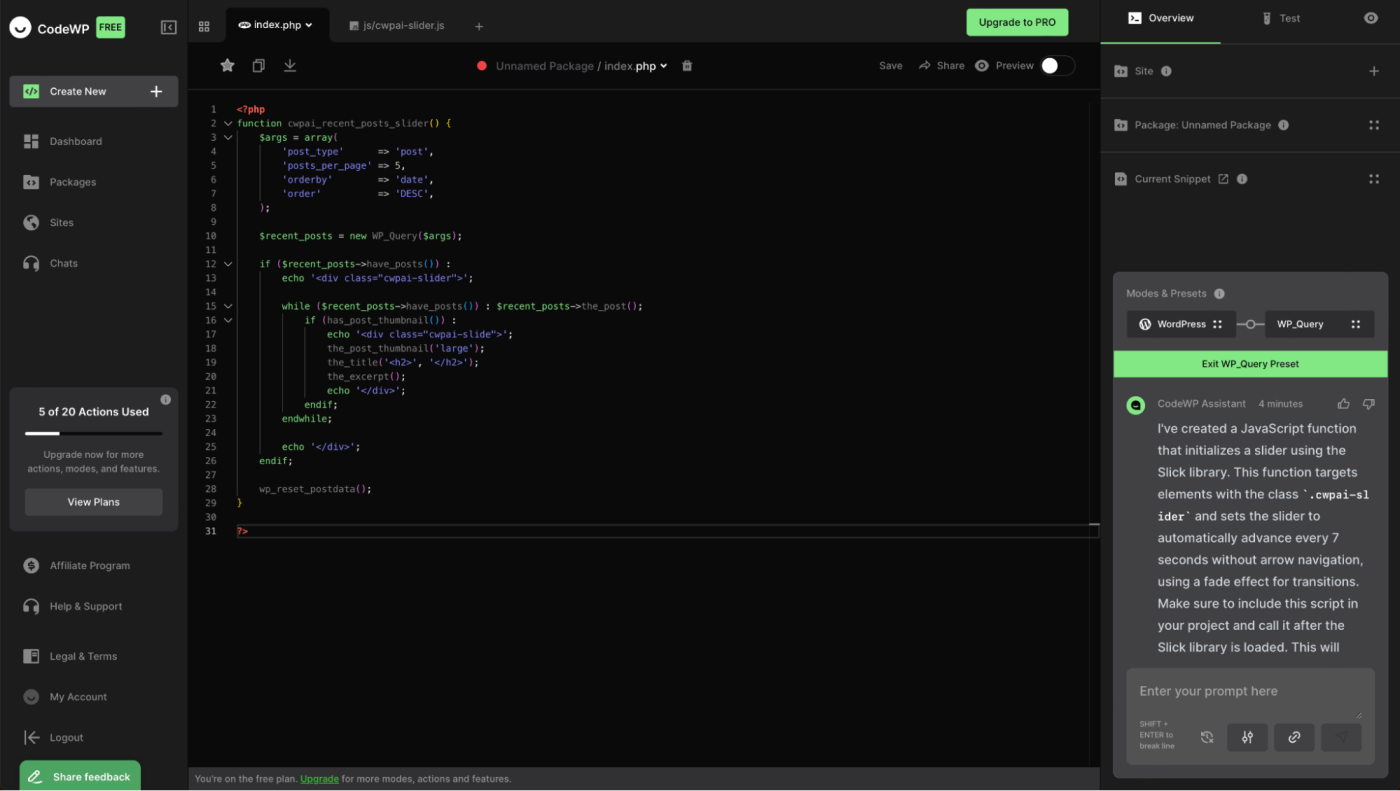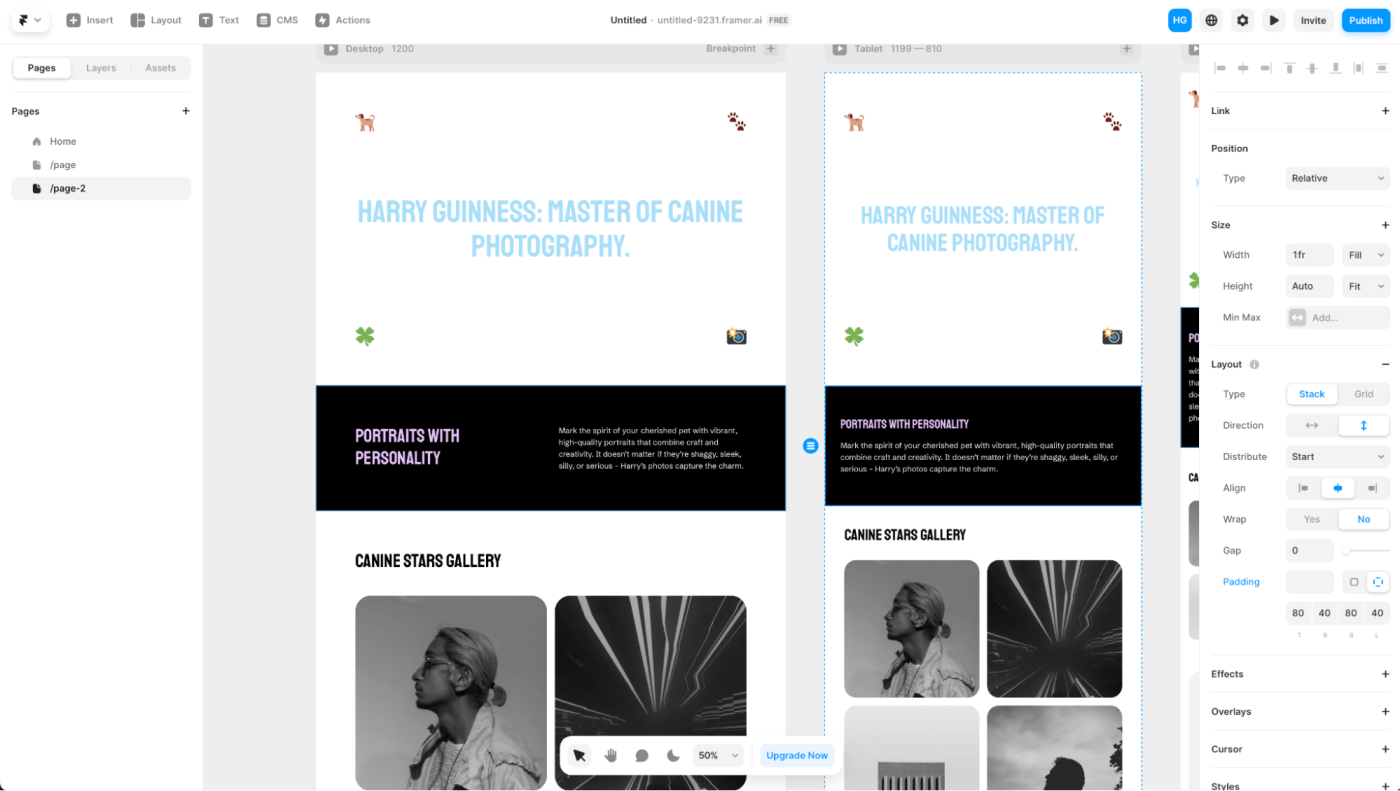Building a website is no longer a particularly hard task—but it can be an annoying one. If you look at most sites, there’s a fair amount of text, images, and general organization to it all. Even with the best tools, it takes a few hours to put together something good. Wouldn’t it be great if you could just create a website from scratch in just a few minutes? That’s what AI website builders claim to do.
The idea is that by using artificial intelligence, AI website builers can streamline everything from designing a site and organizing your content into the appropriate pages to actually getting it online. It’s a bold claim, but there are a few apps that pull it off (with varying degrees of intelligence and success).
I’ve been building websites for more than 15 years and have used hard-coded HTML, WordPress, every site builder you can name, and even, on one regrettable occasion, Drupal. In that time, getting a site live has become a lot simpler and easier. It used to take an entire weekend to get a site up and running, but now, with the best theme-based site-building tools, you can get something great online in an afternoon.
So I was pretty curious to see how the AI website generators would stack up. After lots of testing and tinkering, here are my picks for the best AI website builders.
The best AI website builders
-
Wix for most people
-
Jimdo for a free AI website builder with affordable upgrades
-
CodeWP for an AI tool for complex WordPress sites
-
Framer for an example of where AI website builders are going
What makes the best AI website builder?
How we evaluate and test apps
Our best apps roundups are written by humans who’ve spent much of their careers using, testing, and writing about software. Unless explicitly stated, we spend dozens of hours researching and testing apps, using each app as it’s intended to be used and evaluating it against the criteria we set for the category. We’re never paid for placement in our articles from any app or for links to any site—we value the trust readers put in us to offer authentic evaluations of the categories and apps we review. For more details on our process, read the full rundown of how we select apps to feature on the Zapier blog.
For the past couple years, AI has been the hottest marketing buzzword around. It should be no surprise then that there are now dozens and dozens of tools that claim to use AI to build websites. Unfortunately, of the more than 50 tools I tested, very few of them are in any way good.
The problem is that building something that works kind of like an AI website builder is now fairly straightforward. Connect OpenAI’s GPT API to a white label or open source website builder, and you’re basically there. All you need is a front-end that takes a prompt, and you can have GPT fill in a standard, editable site template with AI-generated text. It won’t be very good, but it will allow anyone to create a website in just a few minutes—which looks great in demo videos and sounds awesome in marketing copy.
And this is kind of the crux of the issue. As far as I’m concerned, an AI website builder has to be a great website builder that happens to use AI, not a glorified tech demo that populates the same template with boring, AI-generated text.
AI website builders work in two main ways. Some apps had me fill in a survey about who I was and what my site was for, while others could build a rough site from a typed prompt like “make a website for Harry Guinness, an Irish landscape photographer who specializes in sunrise seascapes.” If my input genuinely made a difference to the end-product, I was happy to consider it AI-powered, regardless of if it was a form or a prompt. But if a so-called AI website builder took what I said and slotted it into the same generic theme it uses for everything, I was happy to write it off as a poor attempt to cash in on the current AI boom.
On top of actually feeling like an AI, I was looking for website builders that checked a few important boxes:
-
Enable you to make a great-looking site. Theme-based website builders have set the bar really high here, so there’s no need for a website to look like it was built using Dreamweaver in 2005. This requirement actually tripped up some of the most AI-powered builders I considered: they could take a written prompt, but they somehow managed to make something awful from it.
-
Make it easy to get the results you want. Picking a WordPress theme is pretty simple. No matter how AI-powered an app is, if you have to spend ages crafting prompts to get it to produce good, relevant results, or need to spend a lot of time tweaking things afterward in a mediocre site builder, it didn’t make this list.
-
Truly build custom sites. The cynical way to make an AI website builder is to have it take a prompt and then slot that information into a single generic theme. Changing the prompt just changes the headers and maybe the images, not the actual layout of the site. I won’t link to them, but I ran into a huge number of tools like this. For an app to get featured here, it had to allow you to build genuinely custom sites. It should be an AI-generated website, but it shouldn’t feel like an AI-generated website.
-
Offer a good overall experience. The whole point of AI tools is that they make things easy; if any app makes you battle with a bad interface, awkward AI, or anything else, there’s no point using it. There should also be solid documentation in case you do get tripped up.
There were also a couple of things I wasn’t looking for.
-
Standard website builders with generative AI for content. This list is showing off AI-powered website builders, so the AI tools had to actually build the website. Some of these apps also use AI to generate content, but I wasn’t considering any apps that just had GPT baked in to help you write copy.
-
AI design apps. There are lots of apps popping up that help designers mock up websites using AI, but they don’t produce working websites with functional code. This list was narrowly focused on the kind of AI tools that allow you to build and launch a website.
Do you actually need an AI website builder?
Website builders are already really easy to use and have approximately a zillion templates, one of which will definitely work for you.
This list is now on its second update, and I’m still a long way from convinced that you need artificial intelligence to make a great site. And I’m 100% not convinced that being able to build a site from a written prompt in 30 seconds will ever be more than a party trick—or a tool for spammers.
I don’t imagine for a second most people would be able to launch a legitimate site without doing some customizing themselves. That’s why I’d suggest finding an AI website builder that’s backed up by a solid non-AI website builder. It’s the best of both worlds.
The best AI website builders at a glance
|
Best for |
Standout feature |
Pricing |
|
|---|---|---|---|
|
Most people |
A balance of AI and a mature website builder |
Free with Wix branding and domain; from $17/month |
|
|
A free option |
Affordable upgrades |
Free with Jimdo branding and domain; from $11/month |
|
|
Complex WordPress sites |
The ability to create complex WordPress code without actually coding |
Free for 20 AI generations per month; from $28/month |
|
|
Experiencing the future of AI website builders |
Super fun prompt-to-website AI |
Free with Framer branding for hobby projects; from $10/month/site |
Best AI website builder for most people
Wix (Web)

Wix pros:
-
Effective, easy-to-use AI site designer
-
Backed up by Wix’s mature site builder ecosystem
Wix cons:
Wix is one of the best website-building tools across the board. It’s on Zapier’s lists of the best free website builders, the best blog sites, and the best eCommerce platforms. So it’s no wonder that it also tops our list of the best AI website builders.
Wix’s AI site builder manages to balance usability and functionality. You start by chatting with a chatbot, answering questions about what kind of site you want to build. It’s effective, and despite one or two missed requests, it genuinely seems to affect how your site looks when you move on to the AI site builder. You still have to change the AI-generated stock text and images to your own content, but I was able to spin up a functioning photography portfolio in less than 10 minutes.
Crucially, Wix makes it easy for you to change any of the decisions it’s made, both when you’re configuring things with AI or when you’re editing the site it’s built using the great drag-and-drop builder. If the AI totally misses the mark, you aren’t stuck.
Now, Wix isn’t the most AI-powered tool on this list, but I feel it’s still the right option for most people. Wix gives you the choice to use its AI site builder or select from a list of themes, and the AI site builder is the faster option. The fact that you then have a top-notch website builder to tweak the content is a good thing, not a downside. You get the speed of an AI site builder plus Wix’s mature feature set.
And, really, if you’re trying to build a real website, that’s what matters more than anything. You can use Wix to start a blog, sell digital and physical products, take bookings, and anything else you could want. It even integrates with Zapier, so you can automatically create contacts or update a spreadsheet based on Wix automations. Learn more about how to automate Wix, or get started with one of these pre-made templates.
There aren’t many other AI-powered site builders that can match Wix on practicality.
Wix pricing: Free with Wix branding and domain; from $17/month for the Light plan, including a custom domain for one year.
Best free AI website builder with affordable upgrades
Jimdo (Web)

Jimdo pros:
Jimdo cons:
Jimdo, like Wix, is a long-running site builder—and it was also one of the first AI website builders. It launched its AI editor, called Jimdo Dolphin, in 2017, though it seems to have moved away from that branding.
When you build a site, you can select from a theme or have Jimdo build one for you—that’s the AI-powered option. After you describe the purpose of your site (and, if you want, link it to your Google Business listing to get contact information or your Facebook and Instagram accounts to pull images), Jimdo will suggest a style, color palette, and what pages you need. Once you’ve given everything the ok, it’ll take a few moments to create two starting points. Select the one you want, and you’ll have a draft site ready to go.
Like with Wix, you then use the site editor to upload content, configure things like booking modules, and generally tweak your site. It feels less AI-y than Wix, to be honest, but it does work really well. And it’s also more affordable, with paid plans starting at $11/month.
All in all, Jimdo is another great AI website creator if you’re building a personal or business site. It has an AI-powered site builder with enough power to get you started quickly, plus all the features you need to run a real website. Yes, most of the customizing will happen through the regular site editor, but that’s the tradeoff if you want to quickly build a modern website.
Jimdo pricing: Free with Jimdo branding and domain; from $11/month for the Start plan that includes a custom domain.
Best AI website builder for complex WordPress sites
CodeWP (Web)

CodeWP pros:
CodeWP cons:
CodeWP is one of the most interesting and powerful tools on this list. Instead of directly building a site for you, it enables someone with a moderate amount of technical experience to dive deep into WordPress’s inner workings on their own site. (All that also comes with a healthy dose of caveats.)
CodeWP is a GPT-powered code generator trained on hundreds of thousands of lines of WordPress-specific code, including WooCommerce, Elementor, and Metabox. This means you can enter a prompt like:
“Create a function that displays a slider with the header images of the five most recent posts. Include the headline as a h2 and the summary as a p. Advance the slider every 7 seconds.”
And it will return all the code you need, so you can add it to your WordPress site. You can also use the built-in chatbot to edit or explain WordPress code, so you can better customize it to your needs.
Now, as you can imagine, knowing where to add and implement the code with WordPress requires a certain level of understanding of how WordPress works. This isn’t a tool for someone who’s totally new to building sites; instead, it’s for someone who has already built a few websites and would love to be able to customize them even further—but doesn’t have the coding knowledge.
The major issue with any of these AI code generators is that the code they create may be total nonsense (or even pose a security risk). It often isn’t—but it can be. To get the most out of them, you need to be prepared to dive in and troubleshoot things, and have enough experience to figure out where things are going wrong. They can be a great shortcut for technical-minded people who understand the general ideas of computer logic (e.g., loops and variables) but don’t have the familiarity with a specific language to code effectively.
For what it’s worth, I didn’t have any issues with CodeWP in my testing, but I have had plenty of issues with code generators before. I’ll definitely be using this one to add some custom features to Bing’s Best Things, a website I run.
CodeWP pricing: Free for 20 AI generations per month; from $28/month for 10,000 generations and 28 code modes, including WooCommerce and WordPress SQL.
Best example of where AI website generators are going
Framer (Web)

Framer pros:
-
It’s a super impressive and fun AI
-
The rest of the app is great, so you can build a real site
Framer cons:
By this point, you’ve probably noticed a conspicuous lack of super-fast AI website builders on this list. That’s because almost all the tools I tested that claimed to be able to turn a written prompt into a website in just a few moments turned out to be awful. The biggest exception was Framer.
Now, that’s not to say that Framer AI is perfect. It’s just that when compared to some of the other apps, Framer actually works. You start with a prompt (the more descriptive, the better), and it will create a rough website, including generating some AI-generated draft copy. Click here to see what it made for the following prompt:
Design a portfolio website for an Irish photographer called Harry Guinness. He specializes in shooting portraits of dogs, so make it fun. Make sure to include a gallery.
As you can see, it’s kind of fun, and there’s a gallery. But while there’s some text that should be links and buttons that look like they’re clickable, none of them actually work right off the bat. I’d need to add the links myself using Framer’s site builder, where I can also customize everything else. It’s a great site builder, though a bit more technical than what Wix or Jimdo offer by default.
Still, what Framer AI does is a touch more than an impressive party trick. Of all the apps I tested, it was the only one that could take a prompt and really run with it—for good or bad. I don’t think it’s the best way to build a website, and nor is it even the best way to build a website with Framer (it has countless great themes to work from). But what Framer AI teases is how an AI website builder might work in the future, while also offering an AI tool you can use to sort-of start building a website now. Best of all, you can check it out for free.
Framer pricing: Free with Framer branding for hobby projects; from $10/month/site for the Mini plan, with 2 pages and 1,000 visitors per month.
Other AI website builders (and some more options)
Over the past year or two, public expectations of what AI can do have drastically changed. This complicates things when it comes to website builders.
The AI website builders that have been around for a few years—like Wix and Jimdo—work really well and allow you to build functional sites, but they don’t really have the same wow factor as ChatGPT or DALL·E. Both have added more powerful AI features, but at their core, they’re still traditional website builders.
On the other hand, none of the new AI website builders that have launched post-GPT are easy to recommend. Some work as a tech demo—others barely work at all. The only app that really comes close to being the full package is Framer, and its AI features are still pretty rough around the edges.
With that said, there are a few other options worth considering.
-
If you really want to launch a site quickly, check out Carrd or one of the other best landing page builders. While they don’t use AI, you’ll still be able to get something solid up and on the web in an hour or two.
-
Relume is a nice AI-powered website design tool, but you have to export your design to Webflow if you want to turn it into an actual website.
-
Elementor is a design plug-in for WordPress (amongst other things). If you already use it or are happy to add it to your WordPress site, its AI features are worth a look—but it’s not really a standalone AI website builder.
-
Shopify, Squarespace, and all the other big names in website building are adding various AI-powered features. Most don’t really help with designing your website, but that may change.
So, if you came to this list hoping to find a great all-in-one AI-powered website builder that’s as effective as ChatGPT or Midjourney, then I’m sorry to disappoint. While AI tools have been part of website builders for almost a decade, no app has yet put together the full package. The best AI website builders are website builders first, and AI-powered second. Still, they’re a very effective way to launch a new website.
Related reading:
This article was originally published in June 2023. The most recent update was in April 2024.